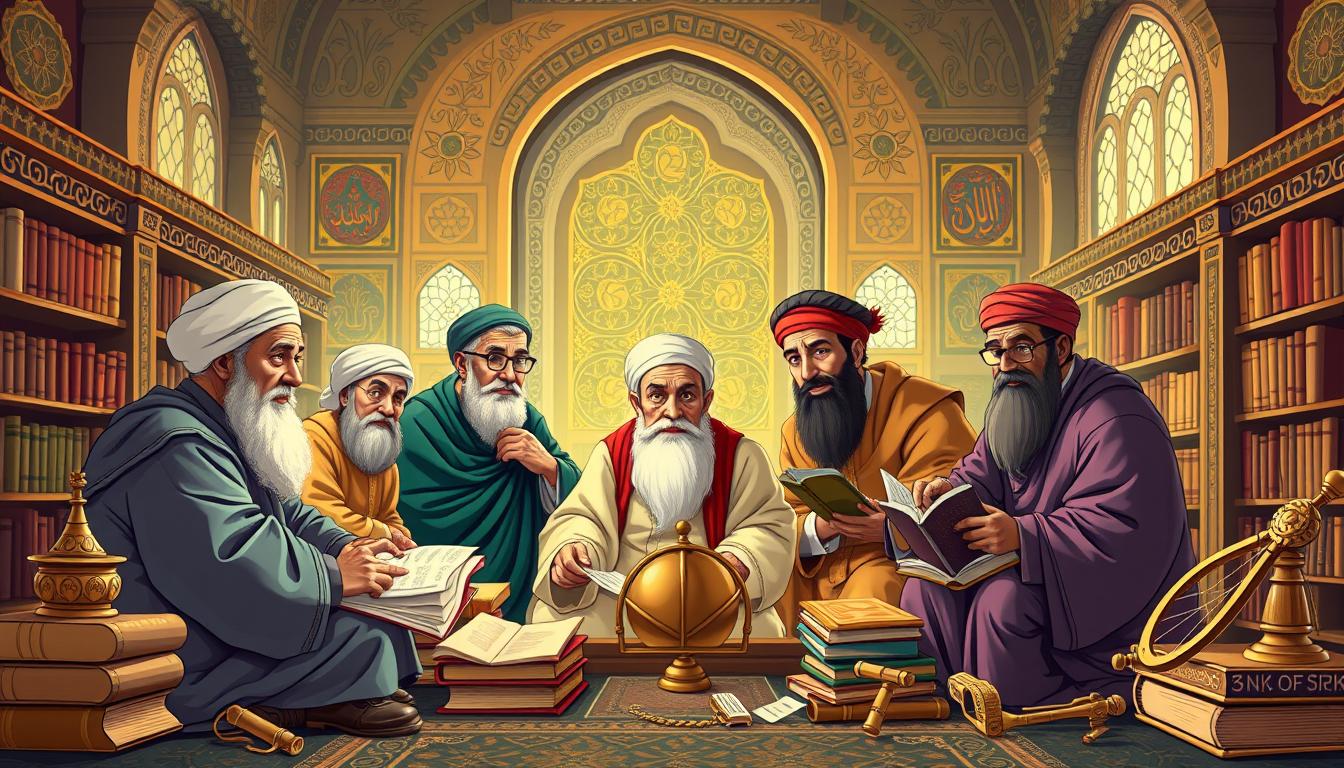Throughout history, key Muslim scholars have shaped Islamic thought and broadened our understanding. They’ve made significant impacts in theology, philosophy, science, and literature. Their influence extends beyond Islamic culture, affecting global civilization. Recognizing these scholars is essential as Islam grows globally.
During the Islamic Golden Age, from the 8th to the 14th century, many scholars stood out. Figures like Al-Khwarizmi and Ibn Sina (Avicenna) made groundbreaking discoveries. Their hard work and brains have left a lasting legacy. This legacy continues to inspire people across different cultures and times.
Key Takeaways
- Key Muslim Scholars have been pivotal in shaping Islamic thought and global civilization.
- The contributions of these scholars span theology, philosophy, science, and literature.
- Many influential Muslim scholars emerged during the Islamic Golden Age.
- Their work continues to inspire and educate future generations.
- Understanding their contributions fosters appreciation for the impact of Islamic thought.
Introduction to Key Muslim Scholars
The journey of Islamic thought traces back to great Muslim scholars. These individuals played a key role in preserving Islamic teachings. They built a strong base for many fields, showing how crucial they were to history.
Importance of Scholars in Islamic History
In Islamic history, scholars were essential in shaping cultures. They studied, explained, and spread key Islamic texts. Their work touched not just religion, but also science, philosophy, and medicine. It breathed life into the Islamic world and encouraged learning for many generations.
Overview of Islamic Thought and Knowledge
Islamic knowledge comes from its scholars’ varied efforts. They set up the House of Wisdom in Baghdad, a major knowledge hub. Here, important texts were translated into Arabic. The Islamic Golden Age was a time of big leaps in math, medicine, and the arts. Islamic scholars have a lasting impact, inspiring Muslims to keep learning today.
Early Scholars: Foundations of Islamic Knowledge
Early Islamic scholars played a key role in forming Islamic scholarly thought. They greatly influenced various fields, creating important foundations in knowledge. This shaped philosophies, sciences, and how education was structured.
Al-Khwarizmi: The Father of Algebra
Al-Khwarizmi is known as the Father of Algebra. He introduced ideas that went beyond his own time and place. His main work, “Al-Jabr,” outlined key math principles that later influenced education in Europe.
This book not only showed how to solve equations in a systematic way. It also made the Hindu-Arabic number system popular worldwide. The term ‘algorithm’ comes from his name, showing his lasting influence on math.
Al-Farabi: The Philosopher of the Second Teacher
Al-Farabi was called the Second Teacher, placing him right after Aristotle. He merged Greek philosophy with Islamic ideas. His work in political philosophy and ethics laid the basis for many future discussions.
Through logic and reason, he helped evolve Islamic philosophy. He set up key themes in the intellectual scene of his time. His work shows how early Islamic scholars deeply interacted with a range of knowledge areas.
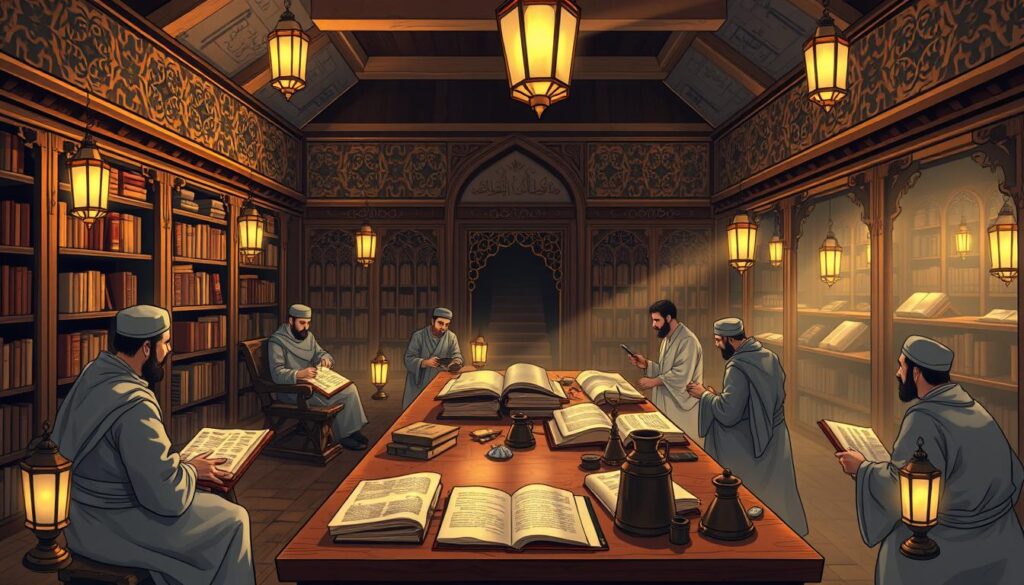
The Golden Age: Flourishing of Intellectual Pursuits
The Golden Age of Islam was a unique time that helped many areas grow. Thinkers like Ibn Sina, Al-Ghazali, and Ibn Rushd were key. They did not just influence the Islamic world but also Western thinking.
They mixed knowledge and spiritual questions well, creating a culture that loved both faith and reason.
Ibn Sina (Avicenna): Contributions to Medicine
Ibn Sina, or Avicenna, really changed medical science. His big work, “The Canon of Medicine,” was used in Europe for many years. It talked about different diseases and ways to treat them.
His way of observing and experimenting started modern medicine. Ibn Sina’s influence is still strong in healthcare all over.
Al-Ghazali: Bridging Faith and Reason
Al-Ghazali found a way to link Islamic faith and Greek philosophy. In “The Incoherence of the Philosophers,” he questioned earlier philosophers and emphasized faith.
He showed how ethics and spirituality could work together with rational thinking. This idea is still discussed in philosophy and theology today.
Ibn Rushd (Averroes): Commentary on Aristotle
Ibn Rushd, known as Averroes, helped bring Aristotle’s ideas back to the Western world. His detailed commentaries helped shape thinking in the Renaissance and modern philosophy.
He argued that seeking knowledge and using reason can go hand in hand with faith. Ibn Rushd’s work added a lot to Islamic scholarship during the Golden Age.
| Scholar | Key Contributions | Impact |
|---|---|---|
| Ibn Sina (Avicenna) | “The Canon of Medicine” | Foundation for medical education in Europe |
| Al-Ghazali | Critique of Greek philosophy | Influence on Islamic theology and ethics |
| Ibn Rushd (Averroes) | Commentary on Aristotle | Reintroduction of Aristotelian philosophy to the West |
Contributions of Female Scholars
The history books often overlook female Islamic scholars. Yet, they have greatly enriched our knowledge. These women played key roles in both learning and spiritual matters.
Fatima al-Fihri: Pioneer of Higher Education
Fatima al-Fihri was a true pioneer in education. She created Al Qarawiyyin in Morocco, the first university to give degrees. Her work was a major step forward for educational access, especially for women.
Her vision broke down walls and inspired many to learn. Al Qarawiyyin still stands, showing her commitment to education and community.
Aisha bint Abi Bakr: Influencer of Hadith Scholarship
Aisha bint Abi Bakr was a leading figure in Hadith scholarship. She played a big part in sharing the Prophet Muhammad’s words. Her work provided vital insights into Islamic rules and ways of life.
She became well-respected, showing women could lead in typically male fields. Her efforts show why we need varied perspectives in Islamic thought.
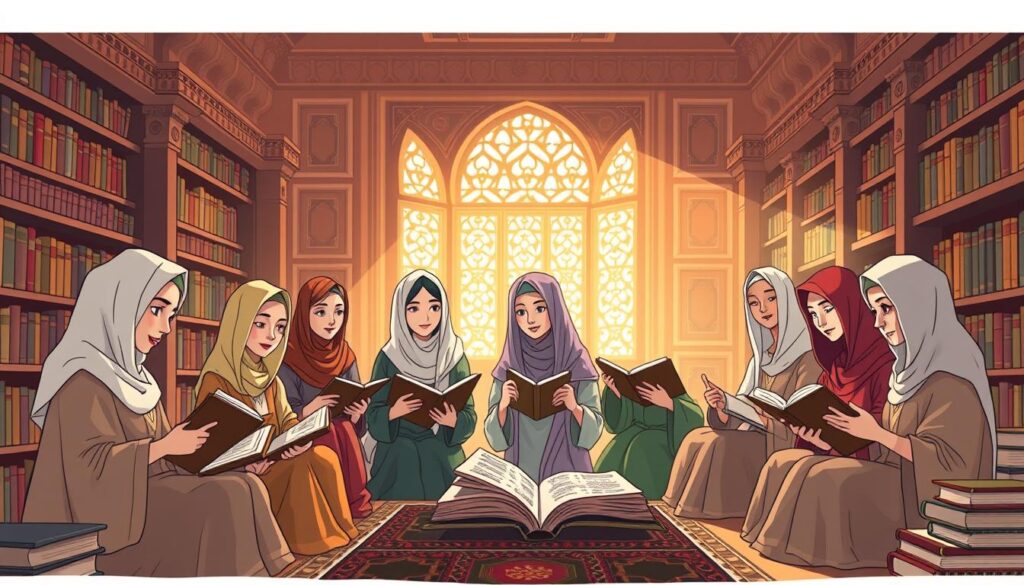
The Role of Sufism in Islamic Scholarship
Sufism is very important in Islamic learning. It focuses on the spiritual side and understanding the divine. It has made Islam’s intellectual world richer. This includes how religion and society shape up. Sufism’s key people, like Jalal al-Din Rumi and Al-Hallaj, have added much to Islamic mysticism.
Jalal al-Din Rumi: Spiritual Poetry and Philosophy
Jalal al-Din Rumi was a very influential Sufi poet, and his poetry is loved across different cultures. His poems talk about divine love and becoming one with God. They go beyond just words. Rumi’s thoughts help us see how we connect with the divine.
He tells us to find our own spiritual path. His focus on love and our soul’s need for connection shows the heart of Sufism. This highlights how it can change us.
Al-Hallaj: Mysticism and Controversy
Al-Hallaj is a key name in Islamic mysticism, known for his strong statements about being one with God. His words, “I am the Truth,” caused a big debate. This debate placed him in a tricky spot between normal and mystical Islamic thoughts. His death sparked deep talks about faith and how we express it.
Al-Hallaj shows how Sufism and regular Islamic teachings can challenge each other. He helps us think deeply about theology.
| Figure | Contribution | Significance |
|---|---|---|
| Jalal al-Din Rumi | Spiritual poetry and philosophy | Emphasizes divine love and personal transformation |
| Al-Hallaj | Mystical expressions and controversial ideas | Questions the boundaries of religious orthodoxy |
These Sufi leaders show us the beauty of Islamic mysticism and its deep effect on Islamic learning. Their work creates a beautiful mix of spirituality and thinking. This opens new ways to understand faith and life.
Modern Scholars: Shaping Contemporary Islamic Thought
Today’s Islamic thought is deeply influenced by modern scholars. They connect old traditions with today’s realities. Muhammad Iqbal is a key figure among them. His ideas focus on self-discovery and pushing for fairness. He fights against ideas that separate Muslims. Iqbal’s teachings encourage unity and a deeper connection with faith and society.
Muhammad Iqbal: The Philosopher-Poet of Pakistan
Muhammad Iqbal’s poetry and philosophy inspire many people. He was more than a poet; he was a thinker who opposed narrow-minded beliefs. He urged for a revival in Islamic thought. His works stress on each person’s and the community’s duty. His vision shifted how Muslims see themselves, pushing for a life filled with purpose.
Seyyed Hossein Nasr: Defender of Islamic Philosophy
Seyyed Hossein Nasr is a key scholar in modern Islamic circles. He seeks balance between Islamic teachings and today’s issues. He defends Islamic philosophy against modern secularism. Nasr reminds us of the lasting value in our traditions. His work has not only enriched Islamic thought but also helped us value our heritage’s wholeness.
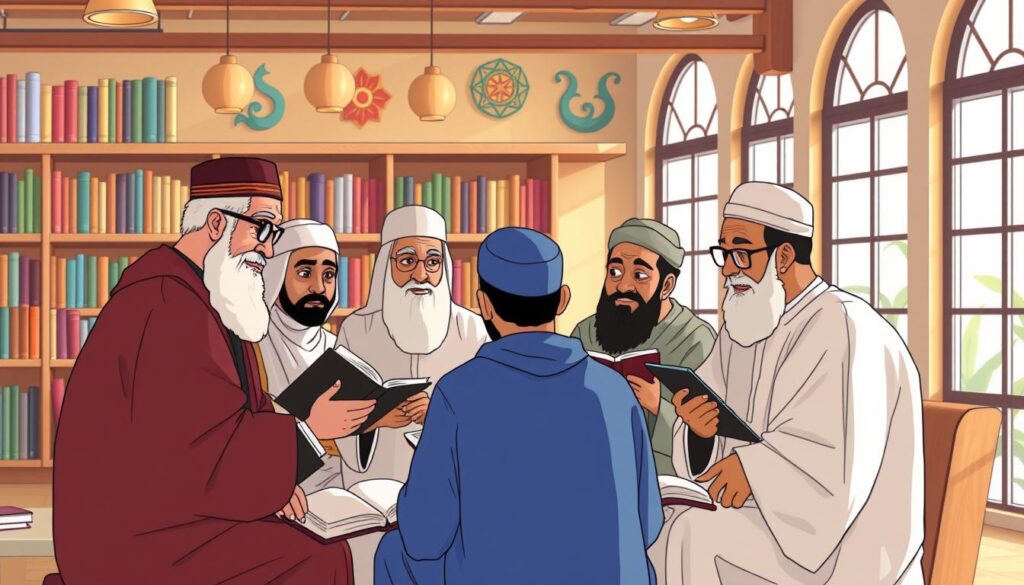
We connect with the teachings of modern Islamic scholars in our journey. Groups like Muslims for Progressive Values strive for welcoming communities. Young Muslims are leading efforts to fight false information and help those in need, even during crises like the pandemic. This shows the importance of Islamic thought in making a better future.
Learning from Muhammad Iqbal and Seyyed Hossein Nasr opens up important conversations. Their teachings help strengthen and bring our communities together. They inspire us to make a positive difference. For more on blending faith with modern life, visit guidance on Islamic dress and modesty.
Differences in Interpretation Among Scholars
In the wide world of Islamic thought, differences in Islamic interpretation have led to unique paths. These differences, like Sunni vs. Shia, show how history and culture shape beliefs. Our look into these views helps us understand how different Islamic denominations form while staying true to Islam’s core beliefs.
Sunni vs. Shia Perspectives
The Sunni and Shia branches are Islam’s main groups, with their own stories and beliefs. Here are some key differences:
- Leadership: Sunnis believe leaders should be chosen by the community. Shias hold that leaders should come from Prophet Muhammad’s family.
- Theology: Their views on leadership affect how they pray and carry out rituals.
- Sacred texts and interpretations: Although both use the Quran and Hadith, they interpret them in their unique ways. This leads to different rules in Islamic law.
Historic Context of Islamic Denominations
The history behind these Islamic denominations is vital for understanding their development. Important events affecting Sunnis and Shias include:
| Event | Year | Impact |
|---|---|---|
| Death of the Prophet Muhammad | 632 CE | Disagreement over successors led to Sunni and Shia branches. |
| Battle of Karbala | 680 CE | This battle is a key part of Shia identity and their stand against oppression. |
| Formation of the Umayyad and Abbasid Caliphates | 661 CE – 1258 CE | These events solidified Muslim leadership and sectarian divides. |
| Modern Political Conflicts | 20th – 21st Century | Recent tensions have been worsened by political struggles. |
These events underline the Sunni vs. Shia differences. By acknowledging these variations, we can have important conversations about Islam’s diverse community.
The Impact of Key Muslim Scholars on Western Thought
During the Islamic translation movement, cultures connected, driving advancements in Western thought. Key Muslim scholars were crucial in translating and saving Greek philosophy, math, and science. This made it possible for Western scholars to build on ancient ideas, influencing many fields.
Translation Movement: Bridging Cultures
The Islamic translation movement linked the East and West, sharing rich knowledge. Scholars translated key works into Latin, changing Europe’s intellectual scene. For example, Ibn Rushd (Averroes) influenced Thomas Aquinas in philosophy, affecting Western thought deeply. Translations like Moses Maimonides’ Guide to the Perplexed helped Europe grow intellectually.
Influence on Renaissance Europe
In the Renaissance, the foundation these scholars built was key. They covered math and natural sciences, kickstarting the period’s learning revival. The Indo-Arabic numbers changed trade and science, pushing Western scholars to new heights. Also, Ibn Tufayl’s Hayy ibn Yaqzan shared insights that struck a chord with thinkers like John Locke, showing how Islamic and European thoughts were linked.

| Muslim Scholar | Key Contributions | Influence on Western Thought |
|---|---|---|
| Ibn Rushd (Averroes) | Philosophical commentaries on Aristotle | Influenced Thomas Aquinas and Christian theology |
| Ibn Sina (Avicenna) | Integrating Greek philosophy with Islamic thought | Significant impact on European medicine |
| Moses Maimonides | Guide to the Perplexed (translated into Latin) | Reshaped Western philosophical thought |
| Ibn Tufayl | Hayy ibn Yaqzan | Inspiration for Enlightenment philosophy |
Key Texts and Their Authors
In the world of Islam, some texts are extremely important. These key Islamic writings are not just for religious advice but also set moral rules for Muslims across time. The Qur’an is the most important of these, with the Hadith, which are sayings and actions of Prophet Muhammad, adding more depth.
The Qur’an: The Ultimate Source of Guidance
The Qur’an was shared over about 23 years, from 609 to 632 CE. It’s at the heart of Islamic faith. This sacred text has 114 chapters and a total of 6,236 verses. Muslims see it as the last of many divine messages that started with Prophet Adam.
The Qur’an talks about what to believe, how to act morally, and how to conduct oneself in life. It also mentions earlier holy books, like the Torah, Psalms, and Gospel, to show the consistency in God’s messages. The Qur’an is famous for its excellent use of classical Arabic, making it a top example of literary genius.
The Hadith: Collections of the Prophet’s Teachings
The Hadith is crucial alongside the Qur’an. It contains collections that capture Prophet Muhammad’s words, deeds, and approvals. These texts give more details on Islamic rules, offering a peek into the Prophet’s life and behavior. While the Qur’an sets up the basics of Islamic law and morality, the Hadith fills in with real-world examples.
Together, the Qur’an and Hadith provide a full guide, influencing the beliefs and practices of Muslims everywhere.
The Legacy of Muslim Scholars in Today’s World
The work of Muslim scholars still impacts our world today. Their ideas go beyond time, solving new challenges and improving life in different ways. We look at how their contributions help us understand ethics, education, and community better now.
Continuing Relevance of Their Teachings
The legacy of Muslim scholars goes beyond history. It offers guidance for today’s problems. Their key ideas from the Islamic Golden Age provide ethical advice and knowledge for us. These ideas influence fields from medicine to math, affecting modern thinking.
Modern Applications of Their Ideas
Today, Islamic thought shows up in many areas. Schools are including ethical lessons in their courses, following early scholars’ teachings. Also, projects to improve communities often use the charitable ideas these scholars promoted. By looking back at this legacy, we learn how to bring ancient wisdom into today’s world. This helps us make smarter, more caring choices for the future.
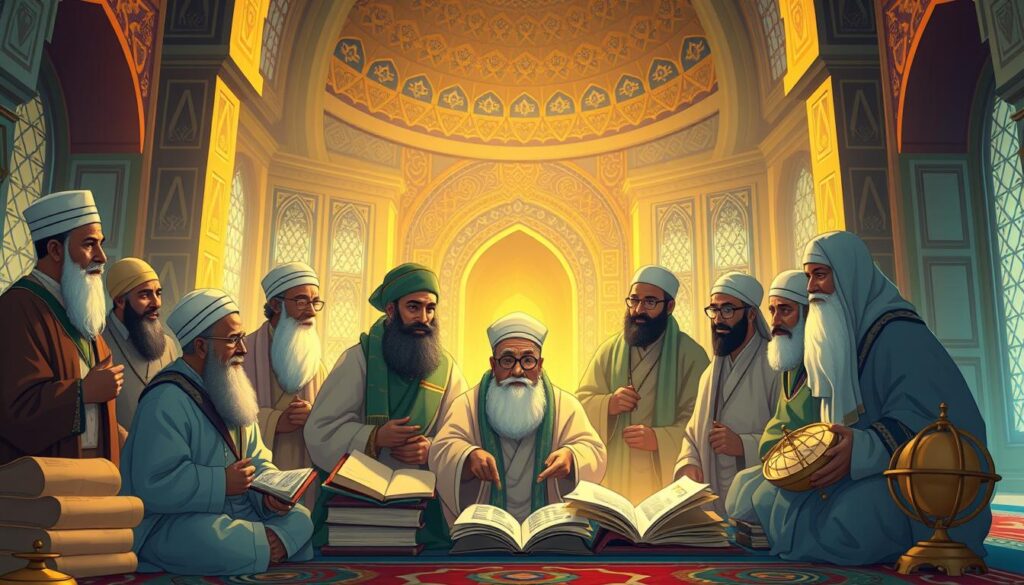
Conclusion: The Ongoing Influence of Key Muslim Scholars
Key Muslim scholars have deeply affected Islamic thought and the wider world. Their work from the seventh to fifteenth centuries led to big advances in math, medicine, and philosophy. Their efforts, like those of Ibn Sina and Al-Razi, help us value this rich heritage and its ongoing impact today.
Importance of Understanding Their Contributions
Understanding these scholars helps us know our shared history, which shapes today’s ideas. The translation movement in the twelfth century shows how their ideas helped Europe, especially in medicine. Their wisdom still affects science and education, showing how important they are in history.
Encouragement for Further Study of Islamic Thought
We encourage more study of Islamic thought to keep knowledge shining. It’s key for future generations to flourish. By exploring this rich history, we ensure the wisdom of the past brings positive changes through learning.

